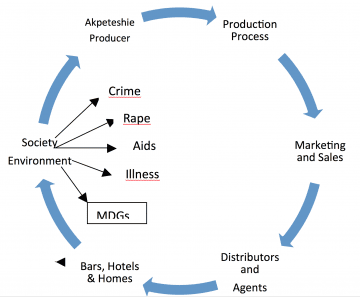Alcohol abuse causes nearly 4 percent of deaths worldwide, more than AIDS, tuberculosis or violence, the World Health Organization warned, but alcohol related abuse and consequence causes more than 15% death. The lack of effective alcohol policy and its implementation in Sub-Saharan Africa have brought Ghana to a looming stage of distress and contributed towards cripling the control of alcohol use in Ghana. In Ghana, the common traditional alcohol is called “Akpeteshie” which is described as deadly.
Akpeteshie is a homebrewed alcoholic spirit produced in Ghana and other West African nations by distilling palm wine or sugar cane juice. Other names for this drink include apio, ogogoro (in Nigeria), sorabi, keley, “hot” or “hot drink” and “kutukù” (in Nzema).
Akpeteshie is not professionally bottled or sealed, but instead poured into unlabelled, already used bottles. The spirit can be bought wholesale from a brewer or by the glass at boutiques and bars. Although not professionally advertised, the stuff is very popular. This is partially due to its price, which is lower than that of other bottled or imported alcohol. It’s relative inexpensiveness makes it a drink associated more with the poor, but even those who can afford better quality are said to consume the spirit also. The potency of the liquor heavily affects the bodily senses, providing a feeling likened to that of a knockout punch. The spirit is between 40 to 50% alcohol by volume.
Akpeteshie is brewed all over Ghana and you need no authority or license to own one and hence you decide how, where and when you will sell and at which strength.
Poor Ghanaians produce this brew for the money obviously and what happens to the society due to the harmful effects of the brew is not there immediate concern and hence the short term effect (profit interest) tends to ignore the long term effects (death, diseases, crime, rape, violence, and other social crimes)
A Ghanaian woman that brew a local akpeteshie, has been published in the widely read Guardian newspaper based in London.
How can a local brewer with such unhygienic production environment, content, health and social consequences be a celebrity and honoured for selling a local brewed alcohol with more than 50% alcohol content (poison) which has lasting consequences to the society and the entire population while an average farmer in Ghana is NOT even noticed?
This is a question I ask to the publishers. Moral values, society and other factors play a huge role in how we advertise and expose alcohol production and usage. I wonder if I sell sex in the streets of Ghana and use the money to take care of my family, maybe The Guardian will publish my contribution to my family as a positive step towards self-sufficiency…
—
For further reading:
The Guardian article: “The Brewer Who Supports Her Family” that portrays the production of a home-brew without any comment and hindsight to the social consequences of the brewing illicit alcohol.
World Health Organization Global Status Report on Alcohol 2011
Global Burden of Disease Study 2012, by WHO and The Lancet


Alcohol advertisement is one the problem we are facing here in Ghana as there are so much in Both in local produced alcohol and refined ones. I am aware that if alcohol policies can be effective and in place it can help Solve the social and economic problem as well as social nightmare we are facing due to the high cunsuption of akpeteshie drink which is poison and bad to the health. Thank you i hope people Will listen
Mycket intressant! Ett problem värt att lyftas fram. Det borde finnas bättre saker att producera är sprit… ! Bra att du reagerar på tidningens ogenomtänkta artikel!
Translation of the comment by Kristina Post: “Very interesting! A problem worth highlighting. There should be better things to produce than booze…! Good that you react to the newspaper’s thoughtless article!”
I think that we see two problems in today’s journalism, growing problems, that have negative impact on the quality of journalism and the selection of topics:
1) For once journalists don’t always manage to leave aside their personal preferences when writing about social issues; we can see it clearly when it comes to alcohol because journalists – who often have gone through university education where alcohol use was extremely prominent – spread and perpetuate myths and social constructions around alcohol that they themselves have bought into, don’t question and don’t manage to leave aside while writing a newspaper article.
2) The alcohol industry is investing loads of money into advertising and is aggressively using many newspaper outlets. This means that those newspaper outlets have an economic interest in writing about alcohol in the way it benefits Big Alcohol, not in the way it benefits scientific evidence, public health and the freedom of journalism.
These two problems all too often inter-play and heighten one another and we can see it most clearly when alcohol policy measures like banning alcohol marketing become issues of wide public interest, like in South Africa or Lithuania: often the fake arguments, the terminology, the fabricated facts of the alcohol industry dominate the discourse. The Guardian at least, like many other so called quality newspapers, should be better than that.